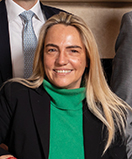Editor’s Note: This is the second in a five-part series on best practices for operating a culturally and globally diverse real estate company. See Part 1.

Benedetta Viganò
Owner and CEO
Giorgio Viganò Real Estate
Milano, Italy
Founded in 1960, Giorgio Viganò Real Estate is headed by 29-year real estate veteran Benedetta Viganò. The company, a member of Leading Real Estate Companies of the World® (LeadingRE), enjoys a healthy, active market in Milan for a variety of reasons. Here, Viganò shares why being prepared to do business in a global environment is key to the company’s continued success.
What is the size of your firm?
Benedetta Viganò: We have one office with five sales associates.
Please describe current market conditions. What are some of the biggest drivers of business?
BV: The real estate market in Milano is actually very good and very active compared to the rest of the country. The most important trend is that the city has become, since the EXPO in 2015 (a universal exposition hosted by Milan, which ran from May through October), the point of reference for investments, both residential and commercial.
What are some of the challenges and opportunities in operating a global real estate business?
BV: Italy has signed the Reciprocity Act, therefore, almost anyone can buy if the Italian can buy in their countries. Some of our biggest challenges are: explaining to clients coming from countries where we cannot buy, why they cannot buy here; financing, if they need a mortgage; or advising if they want to buy a property here with an offshore company. Opportunities are many, however, and surely the most important factor is the word-of-mouth—if you sell a property to a foreign buyer, they will certainly refer your company to friends and clients because they know you are an expert and they trust you because you respect their culture.
Has Milan become more culturally diverse in recent years?
BV: Before the EXPO 2015, Milano was mostly a city for local first-time homebuyers, although it has always been very attractive from a rental point of view, as the city is home to the most important Italian universities. Today, however, Milan is home to international schools, as well as very important hospitals and fashion brands.
Why did you choose to become part of LeadingRE, and how has it helped you succeed on a global playing field?
BV: Our company is the first non-U.S. member to have joined LeadingRE when it was still RELO. Being part of this great network for 16 years has allowed us to place ourselves above the majority of our competitors. Many clients contact us because they know we can provide global exposure. Our continuous presence at conferences has helped us to understand the cultural differences of other countries, thanks to the knowledge of colleagues from other countries and sessions dedicated to the international real estate markets. It is also very easy to refer clients, as we are able to describe the company to our client since we know them personally. From our point of view, we are very relaxed when we refer a client to a LeadingRE member, as we know the network only signs with the best of the best.
Why is sensitivity toward cultural diversity necessary for any real estate firm path forward?
BV: Clients who want to move to other countries need to be understood and respected. It is always scary to buy where you are a foreign citizen, as sometimes it might take years before you are able to embrace another culture that may be very different from yours.
For more information, please visit www.leadingre.com and www.giorgiovigano.com/en/.
 Maria Patterson is RISMedia’s executive editor. Email her your real estate news ideas at maria@rismedia.com.
Maria Patterson is RISMedia’s executive editor. Email her your real estate news ideas at maria@rismedia.com.












